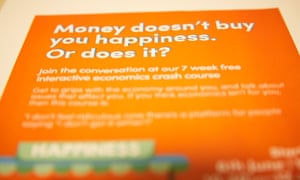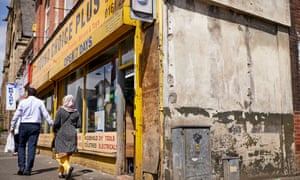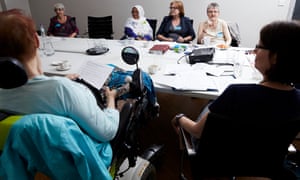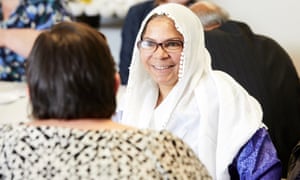In a makeshift classroom, nine lay people are battling some of the greatest economists of all time – and they appear to be winning. Just watch what happens to David Ricardo, the 18th-century father of our free-trade system. In best BBC voice, one of the group reads out Ricardo’s words: “Economics studies how the produce of the Earth is distributed.”
Not good enough, says another, Brigitte Lechner. Shouldn’t economists study how to meet basic needs? “We all need a roof over our heads, we all need to survive.” Nor does the Earth belong solely to humans. Her judgment is brisk. “Ricardo was talking tosh.”
So much laughter rings out of this room that the folk outside must wonder what’s going on. They’ve been told this is an economics course – and participants on those don’t normally dissolve into giggles.
Inside, Pat Bhatt chimes in: “Everything you see around you comes from nature. That’s the basis of everything. Economics is the wrong word. It should be … ecolo-mics.”
Ooohs and aaahs. “Very clever!” beams the facilitator Nicola Headlam and scribbles it down on the flipboard.
“I invented it,” says Bhatt.
“My work here is done,” replies Headlam. “I’ll get my coat.”
Some days, democracy looks like a bashed-up ballot box. Some days, it looks like a furious demo. But on this sun-splashed weekday morning, democracy looks like this low-ceilinged meeting room in a converted church, slap bang in the middle of the road that runs from Manchester to Stockport.
None of the “students” have ever picked up an economics textbook. At a guess, most would be either stumped or sedated by the Financial Times. Yet here they are, starting a crash course in something that to them is a mystery. The majority are retired, having worked their entire lives. But when asked how many of them feel some control over the economy, not one raises a hand. So who is in charge?
“Journalists – who are paid by rich people.”
Amid all the humour pokes a truth. For this group, economics is something that’s done to them, by people sitting far away in Westminster or the City. They bear the brunt of spending cuts; they struggle with the rottenness of Northern Rail and they see neighbours sinking into debt – and they have no decent account as to why. They have been bashed over the head again and again, and not even been shown the offending shovel.
Over in the corner sits Sue O’Connor, who today comes “sponsored by Visa!” Another gentle joke that masks the debtor’s panic of having her disability benefit hacked back. Cancer meant she lost all her income and wound up in sheltered housing. Now 64, she suffers severe arthritis, yet her Motability caris about to be taken away.
While at a secondary modern, her class was judged too thick to learn any maths. Partly because the teenager wasn’t taught to count, the grey-haired woman still feels she doesn’t count. “Information is power,” she tells the group. “If I can learn in this class, maybe others will listen to me.”
More confident is 70-year-old “raging feminist” Lechner. “The economy is a system, right?” she says. “I understand systems like patriarchy and how it’s set so certain people get hurt … and I want to know how the rules of the economy are set.”
Headlam nods: “Somehow, someone, somewhere made these rules up. They aren’t laws of nature.” And they determine “who’s got what and where and why”.

‘Short of paying nine grand a year for a degree, how else are laypeople meant to find out about the most potent social science of all?’ A flyer for the course. Photograph: Christopher Thomond for the Guardian
That tearing sound you can hear is the veil that normally partitions economics from society and politics.
Up till 2008, someone like O’Connor would have been told over and over that if she’d failed to get ahead it was her fault, not the system’s. She’d just not followed the rules. Then came the financial crisis, which turned into a crisis of economics.
When the Queen famously asked why no economist saw the crash coming, she cut to the heart of the matter: perhaps those who wrote the economy’s laws and policed their observance weren’t so qualified after all. And while some practitioners claim that theirs is a semi-science, all prescriptions to revive the economy – from George Osborne’s historic austerity to the hundreds of billions doled out to asset-owners by the Bank of England – underline how it’s fundamentally political. By the time Michael Gove remarked in the Brexit campaign that “people in this country have had enough of experts”, he was picking a squelchy-soft target.
One of the biggest battles over economics kicked off just up the road from this community centre. At the University of Manchester in 2013, economics undergraduates – tired of memorising abstract models while the eurozone burned – linked up with students from around the world to demand their economics curriculum be changed. Nothing beyond the orthodoxy of free-market economics was being taught; no conflicting global developments, nothing of its critics such as Keynes or Marx, despite their contemporary relevance. Thus began an epic, and epically imbalanced, fight of a bunch of teenagers taking on the very professors marking their exam papers.
Student passions usually fizzle out faster than you can say “snakebite and black”, yet a half decade on, the struggle to prise open economics has got broader. Those ardent undergraduates propping up the union bar are now civil servants pushing for change in government economics; or they’re directing charities such as Economy, which is putting on this crash course in Levenshulme. The aim is to nail the format, then do 15 courses next year, partnering with housing associations, local authorities and others across the UK.
As you might expect from the first session of the first course, this morning’s proceedings betray some nerves. In an ordinary jacket and denim skirt, Headlam tells the class: “We had no idea if you would come.” Unlike the brogue-wearing professoriat, she and her co-facilitator Anne Hines give no sense that they come from a distant planet. Tomorrow morning, former pharmacist Hines sits her own economics exam for an Open University degree course while Headlam, even with her doctorate, describes her academic career as making “target practice for the elite institutions”.

‘Levenshulme is supposed to be gentrifying.’ Photograph: Christopher Thomond for the Guardian
The pair are giving their time for free, and attendees don’t pay a penny. Economy’s Clare Birkett put together the course and organised the pilots on a part-time wage. All five courses, each lasting up to two months and educating anywhere between 50 and 80 people, will together cost little more than the tuition fees for one solitary economics degree.
A few academic economists will ask what authority a bunch of amateurs have, but Birkett has prepared her fighting talk: “If they say, ‘How dare you talk about this?’, I’ll say, ‘Why shouldn’t I? I’ve put in the work, I’ve studied these things. This stuff belongs to all of us.’”
Short of paying nine grand a year for a degree, how else are lay people meant to find out about the most potent social science of all? The internet is full of blind alleys, while even public lectures within universities typically assume some prior knowledge. Given how some economists rage that they’re not listened to enough on issues such as Brexit, it’s notable how little they actually engage with the public (one excellent exception is the annual Bristol Festival of Economics).
Not so long ago, a Levenshulme resident could learn economics – or any number of other subjects – through the adult evening classes offered by the University of Manchester. The extramural programme stretched as far afield as Wigan and Burnley, and by the 1970s employed more than 30 academic staff. Then followed decades of cuts, until the entire department was shut down in 2006.
Which makes economics the humpty-dumpty subject: trust in it is thoroughly broken, yet the public lack the basic tools to put the discipline back together again in a form that reflects their needs. A YouGov survey in 2015 found that more than 60% of respondents did not even know the definition of GDP (gross domestic product) – that staple of BBC bulletins and Westminster debates.
To make the economy more democratic, as everyone from Theresa May to Jeremy Corbyn proposes, we need to democratise knowledge of economics. That’s a truth now cottoned on to by organisations as disparate as the Bank of England and Momentum.

‘Everyone here brings their own lived experience of economics.’ Photograph: Christopher Thomond for the Guardian
Those doing the Levenshulme crash course don’t look like your typical seminar room attendees. Not only are they decades older; all but one is a women. The average undergraduate economics course, according to the Royal Economic Society, is about 67% male and 25% privately educated(compared with 7% of the population). After the class, a charity van pulls up outside, offering three bags of short-dated food for £6. Several “students” collect their groceries for the week.
Everyone here brings their own lived experience of economics. In her motorised wheelchair, Joanne Wilcock notes how “everything is much more expensive when you’re disabled”. Bang on, yet you hardly ever read that in an article on the latest inflation figures. Bhatt knows that Levenshulme is supposed to be gentrifying – “fancy cars, flash weddings” – but notices his neighbours can’t afford to do up their own houses. “All fur coat and no knickers!” he concludes, and the room cracks up.
And if you’re expecting them to trot out the usual left-itudes about fixing the economy, you’re wrong. A discussion about Northern Rail does produce calls for nationalisation – but also arguments as to how it should be turned into a co-op, or run by an arms-length organisation of technocrats.Q&A
Share your storiesShow
Lechner starts on about “citizen scientists” – amateurs who conduct their own experiments – and casts an eye around the room. “Why can’t we be citizen economists?”
That may be the most radical suggestion of the day, because it cuts directly against how both right and left usually do their business. In 1894, the year before cofounding the London School of Economics, Fabian Beatrice Webb confided to her diary: “We have little faith in the ‘average sensual man’. We do not believe that he can do more than describe his grievances, we do not think he can prescribe his remedies … we wish to introduce into politics the professional expert.”
That impulse may now be dressed up in polite euphemism – but it lives on. “So many thinktanks and MPs come up with good ideas to change our economy, but they’re all stuck in their political bubble,” says the head of Economy, Joe Earle. “Ordinary people barely get a say in the thing that rules their lives.”
Contrast that with this class and its polite horizontalism, where no one is presumed to be a total expert and everyone is treated as if they have something valuable to say. It is the seeds of that ferment described by Hilary Wainwright in her recent book, A New Politics from the Left.

‘Aklima Akhter only came to this country in 2013.’ Photograph: Christopher Thomond for the Guardian
Drawing on her experience of feminist and workers’ self-organisation, she writes: “Rebel movements shared and developed their own kinds of knowledge, via practice and through debate and deliberation, and on to producing new ideas and the basis of new institutions. Authority, once it has been confidently questioned by those on whose obedience it depends, crumbles in ways that make it difficult to put back together again.”
At the end of the class, each participant tells the rest the best thing they have learned. There’s a pause when it gets to Aklima Akhter, who only came to this country in 2013 and has been sitting so benignly quiet in her white headscarf. She starts haltingly: “It is difficult for me, you know … the subject, the language.”
All around her are faces pursed in little moues of encouragement, but then Akhter speeds up with fluency. “But my favourite word was ‘nationalisation’. Because when things are privatised it is the rich who get all the benefit.” And for once in this room, no one is laughing.